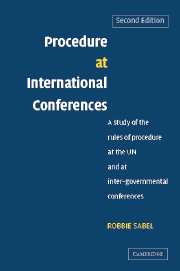 Procedure at International Conferences
Procedure at International Conferences Book contents
- Frontmatter
- Contents
- Preface to the second edition
- List of abbreviations and conference references
- Introduction
- 1 Historical development of rules of procedure of conferences and attempts to establish model rules
- 2 Adoption of rules of procedure
- 3 Rules of procedure and international law
- 4 Invitations, participation and credentials
- 5 Presiding officer and other officers of the conference
- 6 Meetings
- 7 Statements by delegations
- 8 Submission of proposals
- 9 Adjournment and closure of debate
- 10 Amendments
- 11 Withdrawal and reconsideration of motions
- 12 Procedural motions and points of order
- 13 Priorities between different proposals
- 14 Decision taking and method of voting
- 15 Majority required
- 16 Consensus
- 17 Separate votes
- 18 Conduct of voting – interruption of voting and correction of vote
- 19 Languages, records and documents
- 20 Committees
- 21 Suspension and amendment of rules of procedure
- Bibliography
- Index
3 - Rules of procedure and international law
Published online by Cambridge University Press: 22 July 2009
- Frontmatter
- Contents
- Preface to the second edition
- List of abbreviations and conference references
- Introduction
- 1 Historical development of rules of procedure of conferences and attempts to establish model rules
- 2 Adoption of rules of procedure
- 3 Rules of procedure and international law
- 4 Invitations, participation and credentials
- 5 Presiding officer and other officers of the conference
- 6 Meetings
- 7 Statements by delegations
- 8 Submission of proposals
- 9 Adjournment and closure of debate
- 10 Amendments
- 11 Withdrawal and reconsideration of motions
- 12 Procedural motions and points of order
- 13 Priorities between different proposals
- 14 Decision taking and method of voting
- 15 Majority required
- 16 Consensus
- 17 Separate votes
- 18 Conduct of voting – interruption of voting and correction of vote
- 19 Languages, records and documents
- 20 Committees
- 21 Suspension and amendment of rules of procedure
- Bibliography
- Index
Summary
The obligation of States attending a conference to comply with the rules of procedure of that conference
States attending international conferences apparently accept as axiomatic the requirement to comply with the conference rules of procedure. A State not wishing to abide by the rules of procedure has the option of not attending the conference. As a practical matter, a State would be in an intolerable situation if it chose to attend a conference but flouted its rules of procedure.
There is a question however of whether such compliance, apart from being necessary on a practical level, is also obligatory under international law. For example, would it be a violation of international law if, after the conclusion of a conference, a State flagrantly decided to publish the records of a closed session or of a vote in a secret ballot?
In regard to the obligatory nature of rules of procedure, there is a distinct difference between the assemblies of international organisations and independent international conferences.
Obligation of States to comply with the rules of procedure of an assembly of an international organisation
In an assembly that is a subsidiary body of an international organisation, the source of a State's obligation to abide by rules of procedure is the law of treaties. The statute, constitution or charter of an organisation is a treaty, although a treaty of a special type, and States members of such an organisation are bound, under international treaty law, to comply with the provisions of such statute, constitution or charter.
- Type
- Chapter
- Information
- Procedure at International ConferencesA Study of the Rules of Procedure at the UN and at Inter-governmental Conferences, pp. 31 - 50Publisher: Cambridge University PressPrint publication year: 2006


